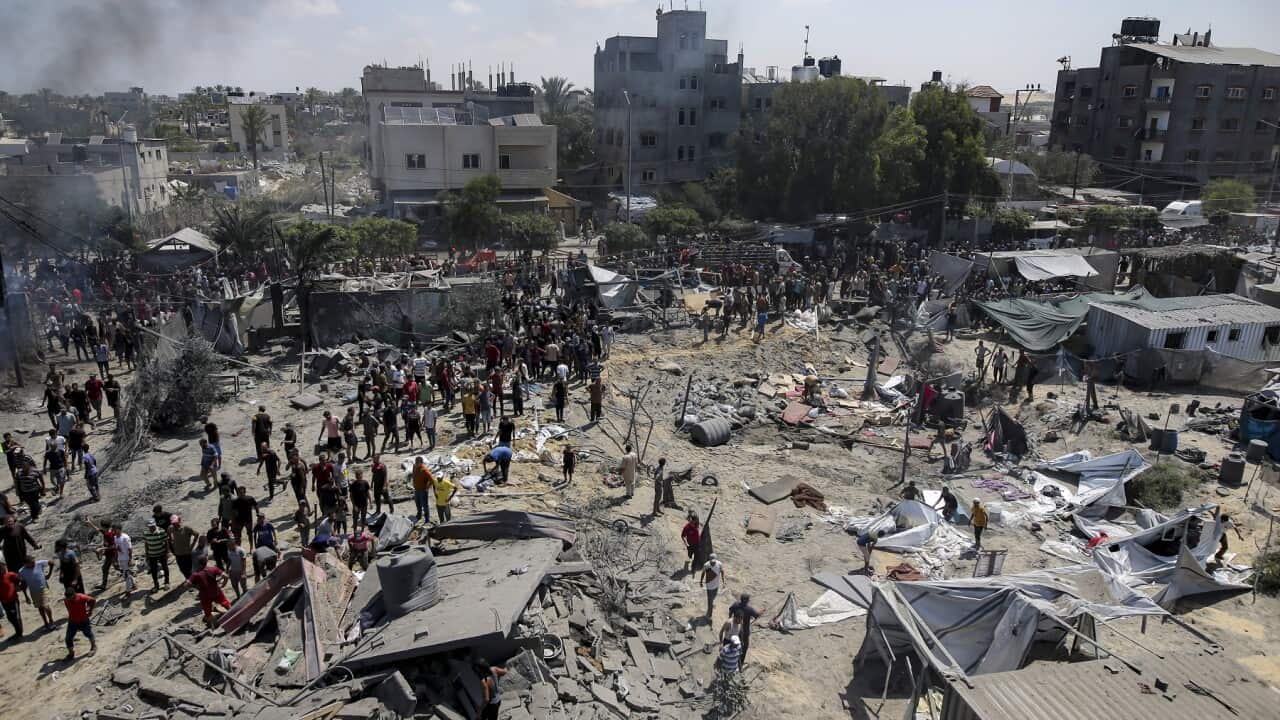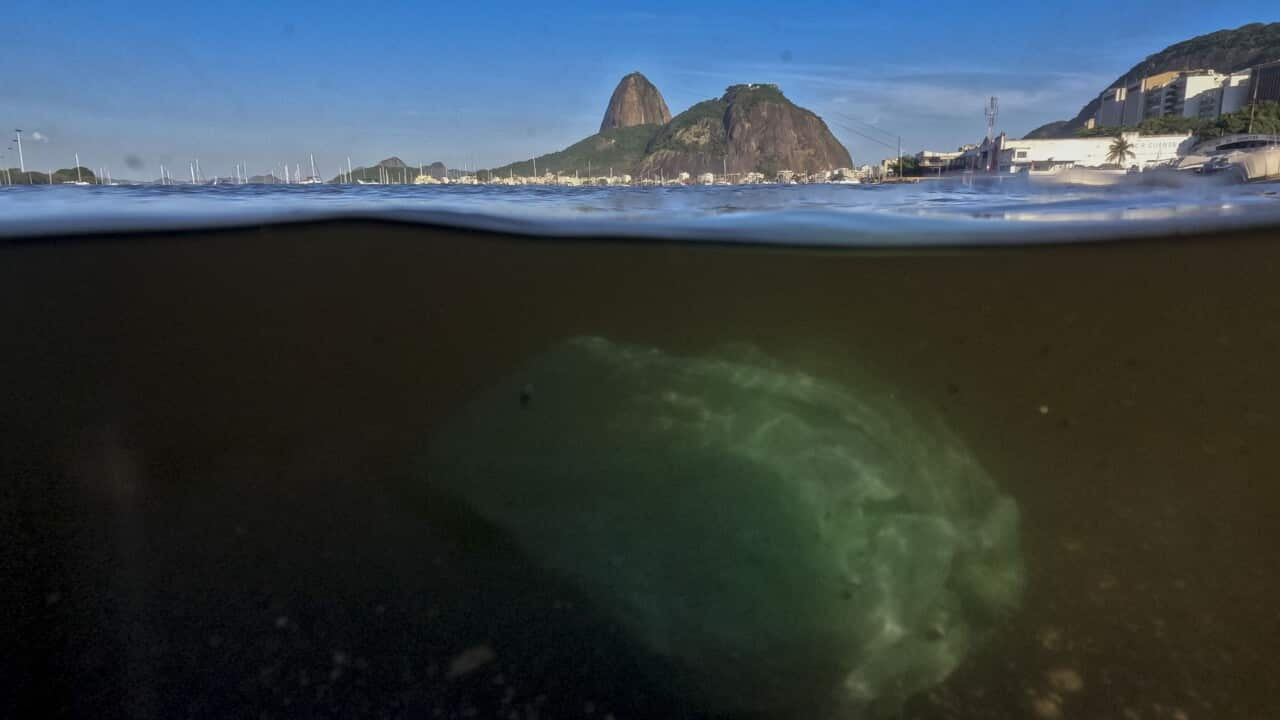TRANSCRIPT
A video released by the Israeli Defence Forces, captured in late July, shows what they claim to be the final moments of Hamas military official Mohammed Deif.
The IDF says they have gathered intelligence which confirms that Deif was killed during the air strike that took place in Khan Younis on that day, but Hamas has yet to comment on the status of its military chief.
It comes following the death of yet another high ranking official of the group, Ismael Haniyeh, earlier in the week, after a strike on his residence in Tehran.
Israel have not claimed responsibility for that attack.
Lebanese Energy Minister Walid Fayed has called on Israel to put a stop on the killings before it's too late.
"I think the international community has been too patient with Israel, and within Israel people know they need to stop the fighting and stop the killing and we call on them to do this now and not spend more effort and money and killing as a waste. It's a waste."
The leader of Lebanese military group Hezbollah, Sayyed Nasrallah has delivered a warning towards Israel, saying it has crossed far too many red lines in recent days with its actions.
Earlier in the week, an Israeli air strike on Beirut took out one of the group's commanders who was said to be in charge of an attack on the Israeli controlled Golan Heights that killed 12 children.
Nasrallah says his group have repeatedly stated they weren't responsible for that attack.
"This is the biggest falsification and deception taking place these days. In the Majdal al-Shams incident, a missile fell in the town. We categorically denied our responsibility for this incident. And we have the courage to assume responsibility if we had bombed any place, even if it was a mistake. Because some people have said that maybe the group (Hezbollah) was wrong. If we were wrong, we would admit it and apologise."
The Hezbollah leader says recent developments have created a new situation in the Middle East.
"There is a battle in Gaza, there is a battle in southern Lebanon, there is an open battle in Yemen and even in Iraq because all of this is happening at the same time. Al Hudaydah is being bombed in Yemen, and Jof al-Sakhr was being bombed yesterday or the day before yesterday in Iraq, and Commander Ismail Haniyeh is being killed in Tehran, and Commander Fuad Shukr is being killed in Dahiyeh. These are no longer fronts, this is an open battle on all fronts and it has entered a new phase."
People in Lebanon who watched the Hezbollah leader's televised speech, largely agreed with his sentiments.
This person says the Lebanese people do not want a full-scale war against Israel, but that they do need to defend themselves against the ongoing attacks.
“It's not a war we wanted but when a person assaults you, and violates your land and honour and kills you inside your home, what will you do? You will defend your land and country and your cause. This war was imposed on us. We have indeed opened a war on the front to achieve victory for Gaza, but we must continue doing so."
Nasrallah says that for the situation in the Middle east to de-escalate, the Israeli army's withdrawal from Gaza is non-negotiable.
Meanwhile, protesters gathered in Tel-Aviv to mark a dark anniversary, as it has now been 300 days since the October 7 attacks that triggered the war in Gaza.
A number of hostages still remain under Hamas' captivity, with Israel vowing to set them free.
Eyal Mor, the relative of one of the hostages, says the elimination of Hamas leader Ismael Haniyeh could prove to be a double-edged sword.
"It's mixed emotions. Like every Israeli, we are very pleased that the one responsible for the massacre on October 7th is no longer with us. On the other hand, it might hurt, it might damage the deal. It could work either way because some people say that it might accelerate the deal because Hamas is now under pressure. Some people say the opposite. We don't know, but we know for one thing. 300 days, that's what we know. 300 days."
The number of people killed during the war in Gaza has now surpassed 39,000, while more than 91,000 have been injured.
Andrea de Domenico, the Head of the United Nations Office for the Coordination of Humanitarian Affairs in the Occupied Palestinian Territory, says many of them have been identified.
"The toll of the war is still increasing. We are now more than 39,000 killed, fatalities in in Gaza as of the 31st of July. The Ministry of Health of Gaza has confirmed the identity of 20,000 out of these 39,000, and they could confirm over 9,000 children, over 2,400 elderly and over 5,300 women among those."
There are fears that those numbers will only increase following the death of Ismael Haniyeh, who was considered a key player in the negotiations for a ceasefire between Israel, Hamas, Egypt, Qatar and the US.
Meanwhile, the Al-Jazeera media network has released a statement condemning the killing of its journalist Ismail al-Ghoul and cameraman Rami al-Rifi.
The two were killed by an Israeli air strike in Gaza, with the network calling for an independent investigation on the incident.













